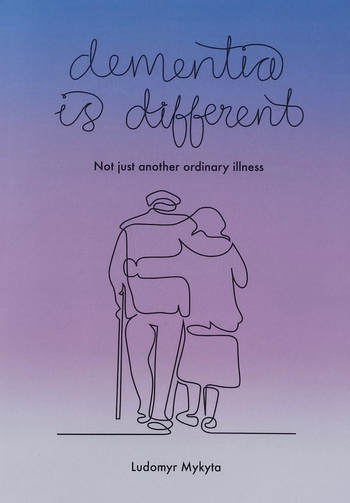reviews |
|
The book is aimed at anyone involved in dementia care and purposefully minimises use of grandiose jargon. It reads far more like a novel than a textbook, and – given it is choc-full of opinions, memoirs or observations from decades of practice at the coal-face – has a partly autobiographic flavour as well.
The book vigorously explores some uncomfortable realities we face in medicine, where the provision of best care for our most complex fellow citizens may be compromised. Dr Mykyta describes this population of ‘geriatric’ patients as members of the ADG (Aged Dependency Group). With a heavy focus on (potentially reversible) systemic issues impeding geriatric care, the book also shines a sharp light on potential problems with bedside clinical reasoning for individual clinicians.
Dr Mykyta’s passion for his subject is clear. He describes being intensely interested in social justice and equity as a youngster, such that he never shirked from challenging “authority, bureaucracy and political masters” if he felt patient care was somehow discriminatory, unfair or sub-par. Accordingly throughout the book he unapologetically ‘calls a spade a spade’ and avoids political correctness – calling-out practices he feels have harmed significant numbers of the 10,000+ cases he has assessed.
There are myriad ‘pearls’ littered through the book, many of which resonated with me as a fellow geriatrician interested in rural and community care. I liked the way he wisely described the need for caution employing Occam’s Razor when undertaking bedside reasoning and enjoyed the easy-to-read section on how we can best elicit patient and collateral history, especially pertaining to so-called ‘functional decline’ (disability). Chapter 5 provides the reader with a handy, detailed ‘recipe to follow’ in terms of history-taking in geriatrics.
However, perhaps the most heartfelt message expounded is something I teach my own students: in geriatric medicine, the ‘patient’ is really a ‘group’ of people, most commonly (but not always) consisting of the afflicted person and their partner. Dr Mykyta’s passionate advocacy for the rights and welfare of carers in this regard is poignant.
What stems from his ardent belief that ‘patients’ are actually a plural entity, is a critique of how we legally assess ‘incapacity’ in insightless individuals within modern medical ethical frameworks; he posits that the primacy granted to the concept of ‘autonomy’ can harm loving partners if the effect of ‘autonomous-but-poor’ decisions by the insightless person with dementia run roughshod over their lives as a collective entity. Illustratively, there is an excellent picture in the book with a man smiling and a woman holding her head in her hands, with the caption: “He has dementia, she has a problem”. Having said this, naturally not all cases run in this way – sometimes the dynamic is different (for example, in elder abuse scenarios). Irrespective, Chapter 3 on ‘ethics’ is certainly thought-provoking.
Exploring systemic issues adversely impacting older people, Dr Mykyta details how the uniquely complicated funding system in Australia – where state governments largely fund hospitals, yet the Commonwealth/Federal government funds both aged and primary care – can leave patients in an abyss. The fact that ‘aged care’ is separated from ‘health care’ within the government’s own departmental structures means, according to Dr Mykyta, aged care is now “primarily about accommodation”, stripping nursing homes of access to consistently high-quality residential health care jointly provided by GPs and geriatricians. The book also opines on problems that ensue from replacing senior doctors with non-medical staff in hospital management, where a ‘disconnect’ between ‘executives’ and coal-face medical experts can be faced. Dr Mykyta fervently supports the concept of seeing complex older patients in their own homes – even if that is less comfortable for clinicians or involves travelling. As a geriatrician equally interested in truly unpicking ‘the reality’ of the patient (versus gleaning a history solely from hearsay and collateral, as often happens behind the metaphorical smokescreen of a hospital cubicle), it was refreshing to read such a staunch defence of home visiting. Overall? Dementia is Different is a thought-provoking, fiery and practical book. It is the ‘real life’ experiences of an impassioned, articulate specialist with an interest in social justice. It depicts the need to advocate for carers as much as patients, and fires both barrels at systemic failings familiar to those in the field. That said, it doesn’t merely ‘rage’ – it offers solutions.
